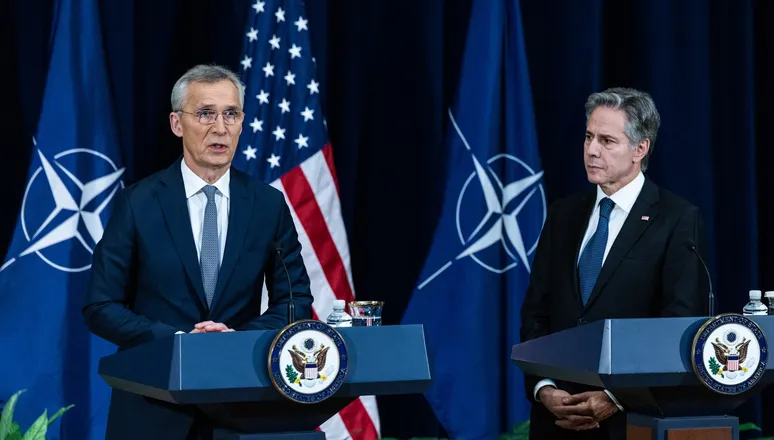By,Azza dridi : Department of International Relations and Strategic Affairs 15/07/2024
Amid an unstable geopolitical order characterized by hostility and brutality in every corner of the world, Russia against Ukraine, Israel against Palestine, China against Taiwan, and now Hezbollah and Iran are threatening to engage in a war against Israel and Cyprus that might reach the Mediterranean and the south of Europe, the North Atlantic Treaty Organization holds its annual summit on the 9th, 10th and 11th of July 2024 to celebrate its 75th anniversary in Washington D.C.
Arming Ukraine, facing the Russian threat, the Chinese competition, the Iranian menace and fighting terrorism, migration and human trafficking, as well as stabilizing the Middle East and Africa are the main outcomes of this year’s summit. Through a 360 degree approach and three core tasks, NATO promises to defend regional interests and establish world peace and security with the help of its member states and partners saluting their tireless engagement and friendly cooperation.
Along with the European Union, the Asian region as well as the Balkans and the Black Sea region, Southern neighbors are an important ally for the Organization to ensure stability in the Middle East and Africa following an action plan based on a comprehensive reflection on challenges and opportunities in the South. Efforts made from the two parts will be coordinated through a Special Representative for the Southern Neighbourhood acting as NATO’s focal point in the region. Moreover, in order to increase rapprochement, NATO Liaison Office will open in Amman, Jordany. And in order to reinforce results, the alliance will enhance its support to the Iraqi Security Institutions through the NATO Mission Iraq (NMI). The main approach of NATO’s southern neighborhood regional cooperation is strengthening engagement, representation and visibility in distinct sub-regions, like North Africa, the Middle East, the Gulf and the Sahel, as well as the adjacent maritime regions, in order to develop its bilateral relations through which it works on different areas of cooperation.
Instability in the southern region, spread through shared borders, is a result of international geopolitical tensions affecting national political, economic and social stability. This leads to growing migration flows, aggravating climate change and drought, food insecurity, inequalities and women’s violence, which creates more crises like the amplification of terrorism and the division among the European Union on migration governance.
In the purpose of addressing terrorism, human and maritime security, climate change, and disinformation, and to fight the threatening Russian, Iranian and Chinese growing influence in the region through public diplomacy and resilience programs, NATO works, according to its short, medium and long term goals, on international cooperation, regional dialogues and peaceful solutions, advice and awareness trainings, establishing focal points and Liaison Office, encouraging political process, crisis prevention, humanitarian aid actions, enhanced scholarships and cultural exchange.
In the light of all these challenges, NATO counts on its southern neighbours to protect its territory and establish regional security and world peace. Modernizing the organization became a necessity with the growing russian menace, a priority in which all member states are taking part by committing to military spendings with around 2% of GDP annually. And at the 75th anniversary, promises are to further strengthen deterrence and defence

